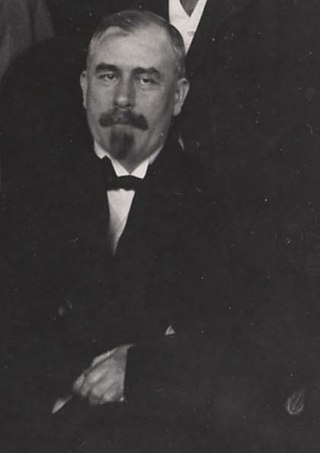
James Bennett McCreary was an American lawyer and politician from Kentucky. He represented the state in both houses of the U.S. Congress and served as its 27th and 37th governor. Shortly after graduating from law school, he was commissioned as the only major in the 11th Kentucky Cavalry, serving under Confederate Brigadier General John Hunt Morgan during the American Civil War. He returned to his legal practice after the war. In 1869, he was elected to the Kentucky House of Representatives where he served until 1875; he was twice chosen Speaker of the House. At their 1875 nominating convention, state Democrats chose McCreary as their nominee for governor, and he won an easy victory over Republican John Marshall Harlan. With the state still feeling the effects of the Panic of 1873, most of McCreary's actions as governor were aimed at easing the plight of the state's poor farmers.

Augustus Everett Willson was an American politician and the 36th Governor of Kentucky. Orphaned at the age of twelve, Willson went to live with relatives in New England. This move exposed him to such authors as Ralph Waldo Emerson, Henry Wadsworth Longfellow, Oliver Wendell Holmes, and James Russell Lowell, who were associates of his older brother, poet Forceythe Willson. He was also afforded the opportunity to attend Harvard University, where he earned an A.B. in 1869 and an A.M. in 1872. After graduation, he secured a position at the law firm of future Supreme Court justice John Marshall Harlan. Willson and Harlan became lifelong friends, and Willson's association with Harlan deepened his support of the Republican Party.

Edward Clay O'Rear was an American politician who served on the Kentucky Court of Appeals and was a Republican candidate for the United States House of Representatives in 1888 and for Governor of Kentucky in 1911. His father died when O'Rear was very young, and he began work as a printer's devil to help support his mother and fourteen siblings. Eventually, he became editor of the Mountain Scorcher newspaper and read law under its publisher. He gained admission to the bar in 1882.

The 1904 New Jersey gubernatorial election was held on November 8, 1904. Republican nominee Edward C. Stokes defeated Democratic nominee Charles C. Black with 53.50% of the vote.

The 1970 Michigan gubernatorial election was held on November 3, 1970. Republican William Milliken won the election, defeating Democratic nominee Sander Levin.

The 1950 Kansas gubernatorial election was held on November 7, 1950. Republican nominee Edward F. Arn defeated Democratic nominee Kenneth T. Anderson with 53.77% of the vote.

The 1948 Connecticut gubernatorial election was held on November 2, 1948. Democratic nominee Chester Bowles narrowly defeated incumbent Republican James C. Shannon with 49.31% of the vote.

The 1946 Connecticut gubernatorial election was held on November 5, 1946. Republican nominee James L. McConaughy defeated Democratic nominee Charles Wilbert Snow with 54.38% of the vote.

The 1903 Kentucky gubernatorial election was held on November 3, 1903. The incumbent Democratic governor, J. C. W. Beckham, defeated Republican nominee Morris B. Belknap to a win a term in his own right.

The 1920 Rhode Island gubernatorial election was held on November 2, 1920. Republican nominee Emery J. San Souci defeated Democratic nominee Edward M. Sullivan with 64.64% of the vote.

The 1900 Colorado gubernatorial election was held on November 6, 1900. Democratic nominee James Bradley Orman defeated Republican nominee Frank C. Goudy with 53.78% of the vote.

The 1875 Kentucky gubernatorial election was held on August 2, 1875. Democratic nominee James B. McCreary defeated Republican nominee John Marshall Harlan with 58.31% of the vote.

The 1906 Kansas gubernatorial election was held on November 6, 1906. Incumbent Republican Edward W. Hoch defeated Democratic nominee William Alexander Harris with 48.24% of the vote.

The 1920 Ohio gubernatorial election was held on November 2, 1920. Republican nominee Harry L. Davis defeated Democratic nominee A. Victor Donahey with 51.91% of the vote.

The 1904 Kansas gubernatorial election was held on November 8, 1904. Republican nominee Edward W. Hoch defeated Democratic nominee David M. Dale with 57.92% of the vote.

The 1911 Rhode Island gubernatorial election was held on November 7, 1911. Incumbent Republican Aram J. Pothier defeated Democratic nominee Lewis A. Waterman with 53.36% of the vote.

The 1904 Rhode Island gubernatorial election was held on November 8, 1904. Republican nominee George H. Utter defeated Democratic incumbent Lucius F. C. Garvin with 48.94% of the vote.

The 1912 Iowa gubernatorial election was held on November 5, 1912. Republican nominee George W. Clarke defeated Democratic nominee Edward G. Dunn with 39.93% of the vote.

The 1924 Indiana gubernatorial election took place on November 4, 1924 under the provisions of the Constitution of Indiana. It was the 31st gubernatorial election in the State of Indiana. Republican Edward L. Jackson defeated Democrat Carleton B. McCulloch. The election took place concurrently with the 1924 United States elections that saw Republicans hold the White House and increase their majorities in both houses of Congress.

The 1920 Indiana gubernatorial election was held on November 2, 1920. Republican nominee Warren T. McCray defeated Democratic nominee Carleton B. McCulloch with 54.63% of the vote.























